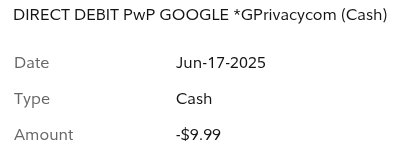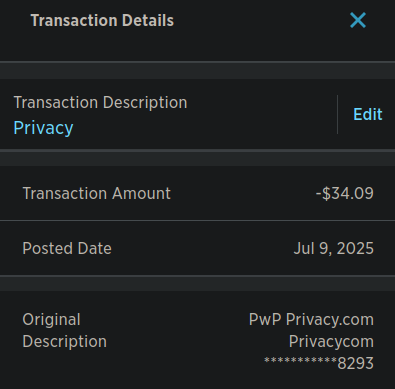First I will say something nice about privacy.com:
Privacy.com is a useful tool for preventing merchants from over charging you or for free trial sign ups and the like,
but
it is not useful for preserving your privacy which is ironic because they are called privacy.com.
From their privacy policy:
We Share Personal Information Under Controlled Circumstances Only:
- With third parties who may access data about you to provide you with the Services
- With third parties who may access data about you to perform functions on our behalf
- With financial institutions, processors, payment card associations and other entities that are involved in the payment process
- With government and law enforcement where reasonably necessary to protect user or public safety or comply with applicable law, regulation, legal process, governmental request
- With others where reasonably necessary to protect the security or integrity of our Services or user safety
- In connection with, or during the negotiation of, any merger, sale of company stock or assets, financing, acquisition, divestiture or dissolution of all or a portion of our business, or
- With your consent
We may share aggregated and anonymized information that does not specifically identify you or any individual user of our Services.
These “controlled circumstances” SUCK. “Perform functions on our behalf”?
It is meaningless and gives me zero confidence that privacy dot com is doing anything to preserve the privacy of my transactions.
Even if you were to give them the benefit of the doubt and assume that privacy dot com is behaving in a way that shields privacy, it is easily disprovable that they’re not preserving privacy, but rather passing the buck to whatever bank account you have hooked up to your account. What do I mean by this? Look at my bank statement for a recent transaction I made using a privacy.com credit card:
It says GOOGLE. The merchant I used the card with is Google. Even if I were to blindly trust privacy dot com to protect this information from data brokers or whoever, GOOGLE still shows up in my bank’s transaction log and I certainly don’t trust my bank to protect the privacy of my transactions.
So unless you have a privacy respecting bank (there are none) and you trust privacy dot com to protect your transaction information, your information is getting shared no matter what.
Handy chart for when you should use privacy.com
| Reasons to use privacy.com | Things you SHOULDN’T use privacy.com for |
|---|---|
| Free trial sign ups | Privacy |
| Sketchy merchant websites | |
| The dentist | |
| AWS account with autoscale enabled |
Wait but there’s hope
There’s only one way to be certain that the financial details between you and an online merchant are private:


